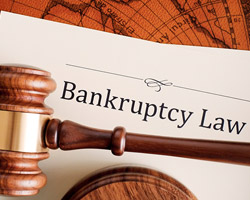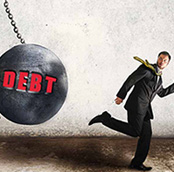Bankruptcy FAQs

What is bankruptcy?
Bankruptcy is a legal action for debtors to deal with insolvency. Most debtors are given relief even if there is not a complete discharge of debts.
There are various types of bankruptcy, and debtors are eligible for certain forms of bankruptcy based on their financial situation, their type of business (in the case of a business bankruptcy) and other factors. In all cases, the bankruptcy court appoints a trustee to oversee the bankruptcy proceedings.
A bankruptcy may be voluntary or involuntary. A voluntary bankruptcy (the most common form) is initiated by the debtor; a creditor initiates an involuntary bankruptcy. A debtor may contest an involuntary bankruptcy petition.
Once the bankruptcy petition is filed, creditors are prohibited from using any means other than the bankruptcy process to attempt to collect a debt—they may not call, write or take legal action againsta debtor.
How does filing bankruptcy stop creditor actions?
As soon as you file a bankruptcy petition, the court issues an automatic stay, a legal action that prevents creditors from pursuing collection activities or legal actions against you in an effort to collect debt. In most instances, if the creditor obtained payment of any funds after the petition was filed, those funds must be returned and become available to all creditors through the bankruptcy process.
Repeat bankruptcy filers are subject to different rules under the Bankruptcy Abuse Prevention and Consumer Protection Act of 2006. Consult a bankruptcy attorney regarding how the automatic stay may be handled under the new rules if you previously had a dismissed bankruptcy.
How frequently can I file for bankruptcy?
If you filed a Chapter 7 bankruptcy and received a discharge, you must wait eight years before filing another Chapter 7.
You cannot receive a discharge in a Chapter 13 case if you received either:
- A discharge in a prior case under Chapter 7, 11 or 12 that was filed within four years of the current Chapter 13
- A Chapter 13 discharge in a case filed within two years of filing the current Chapter 13
There are circumstances, however, where you may initially file a Chapter 7 and a subsequent Chapter 13 in less time. Talk to an experienced bankruptcy attorney to see if this approach (known as a Chapter 20) is appropriate for your circumstances.
Do I have to list all of my creditors in my bankruptcy petition?
Yes. You must list any company or person to whom you owe money, from businesses to friends and family.
Will my employer discover that I filed for bankruptcy?
You usually don’t have to worry about your employer finding out about your bankruptcy unless your employer is one of your creditors or your wages are no longer being garnished, in which case your employer may follow up to learn why the garnishment ceased.
Will I lose my job after filing for bankruptcy?
No. Federal law prohibits termination from a job because of a bankruptcy filing.
How will bankruptcy affect my credit rating?
Chapter 7 bankruptcy remains on your credit report for 10 years, and Chapter 13 remains for seven years. You may start qualifying for loans as early as one year after filing bankruptcy if you meet the income requirements. However, the lender will likely charge you higher-than-normal interest rates. It may take five to seven years before you are offered normal interest rates again.
Can I repay a creditor after I file for bankruptcy?
Under Section 524(f) of Title 11, you are authorized to repay any creditor you choose, once your bankruptcy is finalized.
Will bankruptcy discharge taxes owed?
There are circumstances that discharge tax debt. For Chapter 7, if you filed your tax return for the year, your debt will be discharged under these circumstances:
- The Three-Year Rule: Your tax return was due more than three years before your bankruptcy filing. If you obtained an extension, the due date would be the extension deadline.
- The Two-Year Rule: Your late return (filed after its due date and any extensions) was filed more than two years before to the bankruptcy filing.
- The 240-Day Rule: The IRS assessed your taxes more than 240 days before the bankruptcy filing.
- You did not file a fraudulent return or knowingly attempt to evade paying taxes.
There are other taxes your attorney can review with you, such as trust fund taxes, tax liens and taxes not covered by the Two-Year and Three-Year rules. Because these tax areas can be complicated, an experienced bankruptcy attorney can be invaluable in helping you sort out what taxes are discharged and what taxes you still owe.
Do I have to go to court after I file for bankruptcy?
With a Chapter 7 bankruptcy, you usually have to attend one meeting of creditors before your bankruptcy trustee, which takes place 20–40 days after filing your bankruptcy petition. For a Chapter 13 bankruptcy, you will have go to court for two appearances before your trustee — for the meeting of creditors and the confirmation hearing.
If you are seeking extra relief, other court appearances may be required. Your discharge is entered after all required plan payments have been made and your certificate evidencing completion of the Instructional Course in Personal Financial Management has been filed.
How can I re-establish my credit after bankruptcy?
You can re-establish your credit by getting a co-signer on a loan and also by getting a secured credit card. With a secured credit card, your credit limit is based on the sum of money you gave the creditor as security for your card.
Can I keep a credit card after bankruptcy?
Yes. If the credit card was not adversely affected by your insolvency, most credit card companies will continue to do business with you after filing for bankruptcy.
What are the signs that I may be in financial trouble?
- You’re making balance transfers from one card to another card with a lower interest rate.
- You are able to make only minimum credit card payments.
- You have maxed out your credit cards.
- You are covering basic living expenses, such as food, with your credit card.
- You’re taking cash advances from one card to pay another.
- You need a co-signer before you can qualify for a loan.
- You cannot afford health insurance because all of your money is being used to cover revolving debt.
- You are refinancing your house over and over again to pay down debt.
After filing for bankruptcy, what entries will appear on my credit report?
While creditors are supposed to notify credit-reporting agencies when debts are discharged, they do not always do so. As a result, you may have discharged debts still appearing on your credit report. You should send copies of the following documents to the three credit reporting agencies to ensure your credit report accurately reflects your discharges:
Discharge of Debtor and Order of Final Decree
Notice of Bankruptcy Case Filing (attached to the front of your petition)
Schedules D, E and F of your bankruptcy petition, together with any amendments of said schedules.
Experian
PO Box 2104
Allen, TX 75013
Equifax Information Services
PO Box 105873
Atlanta, GA 30348
TransUnion
PO Box 1000
Chester, PA 19022
Unless you specifically hire your attorney to do so, it is not his or her job to clear up any errors on your credit report once your debts are discharged. You can easily take the above steps yourself and save the expense of additional attorneys’ fees.
Connect with Top-rated Attorneys Near You
Sponsored Advertisement
Latest Article
The Exclusionary Rule: Definition, Examples, and Impact
What Is the Exclusionary Rule? What Are Common Situations Where It Applies? Are There Exceptions? How Has It Changed Cri... Read More
False Imprisonment: Protecting Yourself Against Wrongful Detention
What Is False Imprisonment? What Are the Potential Remedies? Are There Exceptions to the Rule? As humans, one of our mo... Read More
Lying Under Oath: The True Penalty for Perjury
What Is Perjury? What Must the Prosecutor Prove? What Are the Penalties? In the legal system, oral and written testimon... Read More
GETLEGAL®ATTORNEY DIRECTORY
Find Leading Attorneys in Your Area
NEED PROFESSIONAL HELP?
Talk to an Attorney
How It Works
- Briefly tell us about your case
- Provide your contact information
- Choose attorneys to contact you





